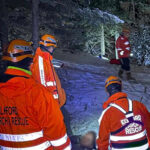Home »

The Liberals, police and the mentally ill in B.C.
Letter to the Editor
The story of the B.C. Liberal government, the police and the mentally ill in B.C. is not a happy one.
The mentally ill have been abandoned, care and programs cut and services are strained. Hospital facilities are overwhelmed. The mentally ill are an ignored underclass.
To save money in 2001, the Riverview Mental Hospital (pictured) was closed. Some 10,000 mentally ill people who could not care for themselves were cast out. A few were taken in by families. Most lived on the streets. Some are still there. Many voices protested this cruelty but, like most of the disadvantaged groups in society, there was no attention paid by those in power. The dollars spent by the Ministry of Health on care and services has risen from $865 million (2001) to $1.3 billion (2012) but this has not kept pace with demand.
The recent report of a manic young man, taken by the police to a Surrey hospital for treatment, who was given a pill and released, then jumped to his death from a bridge, is not an isolated case. The plight of the mentally ill in B.C. is severe. Police and mayors of municipalities, including Gregor Robertson of Vancouver and Vancouver Police Chief Wayne Chu, are calling for Riverview to reopen and for more money to be spent.
Unfortunately, B.C.’s debt, not including that of Crown corporations, has since 2001 grown from about $30 billion to $60 billion. The 2012 deficit was some $1.4 billion. A small surplus was reported in the second quarter of 2103. The government is committed to debt reduction. There is no extra money unless further debt is incurred. However, there was $12 billion for the Olympics, $6.8 billion for the Port Mann Bridge and likely an equally extravagant sum to be spent with the announcement of the replacement of the Massey Tunnel by a bridge.
Hospital wards for the mentally ill are full. Patients cannot get effective treatment in ERs. Getting in to see a psychiatrist is next to impossible. As a result, the police, unwillingly, and the courts have become the services that deal with the mentally ill. Neither are trained or equipped to provide care. The police are overwhelmed with 21% of police calls this year relating to a mentally ill person. The courts deal with the criminal process and the protection of society, not the care or treatment of the mentally ill.
My experience with the system is personal. Twelve years at U.B.C. armed me with a double honours in music composition and 18th century French literature, an engineering degree and a law degree. My career was a high level legal journey through the international world of large corporate financings, reorganizations and mining deals. In 1996 my genetic pool, which is replete with the mentally ill, addicts and suicides, took its revenge.
I had a bipolar “event”. This is when the brain, previously somewhat stable, starts to swing unpredictably into severe mania or depression or from one to the other. Initial clinical depression, greatly assisted by the prescription of Prozac by a doctor who did not realize I was bipolar (and I had no idea), quickly turned into extreme mania and a first committal at St. Paul’s Hospital, Vancouver for five months. My career was over. That became a minor consideration as my brain continued to spiral into mania. For the next 17 years, I was the recipient of misguided, inept and often harmful medical treatment that turned me from a vegetable into an extreme manic with no connection to the planet. As with most of the mentally ill, I soon attracted the attention of, and became acquainted with, the police.
Medications that worked for other people labeled “bipolar” did not work for me. One combination of medications after another was tried. In the middle of manic episodes, or severe side effects or devastating withdrawal after a medication was stopped, I would disturb my neighbours or foolishly go outside where my irregular behaviour quickly attracted the attention. The police, responsible for maintaining order and protecting the public, were called. Arrested many times, I was soon entered in the police computer as “extremely mentally ill, very unstable.”
After 2006, I was partially balanced but still had severe but irregular manic spikes that would for several days. I was, however, one of the few lucky ones. A doctor in 2012 tried new pills and I got my 1995 brain back.
With medical care and services severely reduced, the police and the criminal law system are the vacuum that removes the mentally ill from the streets. A night in jail is often enough to be able to get back on the street. On six occasions that I can remember (memory can be a tricky devil when manic), I was taken by the police to be admitted at a Vancouver hospital for treatment. Each time, after the police left, I was told there was no room at the inn. Each time, I wandered off into the night, manic and was often arrested again in the next few days as the mania persisted.
My 17 years of illness were replete with multiple arrests, police beatings, showers of pepper spray, broken glasses (the police are so clumsy; they always manage to step on your glasses), criminal charges, convictions and so many arrests, legal and illegal drugs, periods of withdrawal from legal drugs and committals I cannot count the number. At all times, I was seeking medical help to try to become balanced. Until 2012, nothing worked. Most times, the legal medications tried were far worse than illegal drugs.
I also have the disadvantage of being physically large and appeared at first sight a threat not only because I was known to be mentally ill but also because of my size. The mantra in society is that the mentally ill are dangerous. This is not always true, but the mentally ill are certainly unpleasant and often loud. The citizen does not want his life disturbed or possibly threatened by the mentally ill. The mantra of danger compounds the way the mentally ill are treated and increases the confusion and pain afflicting the mentally ill.
When arrested, I usually had about eight or more adrenaline charged officers attending, several in riot gear, and at times the appearance of dogs, ready to respond harshly with a severe beating at the least sign of resistance or violence. Fortunately, I never resisted or was violent. But, I have even been dragged naked from bed after a neighbor feared I was a threat and called the police. I also have a rather sharp tongue, which often infuriated the police and incited extra pepper spray and a hard kick or five for good measure. I became inured to pepper spray.
Before I turn to the issues confronting the police, I would like to make two observations. First, neurology is in its infancy. Science knows little of the brain and diagnoses like “bipolar” are crude. The medical system is trying its best, but the brain is an unknown frontier. When prescribing medications, doctors play pin-the-tail-on-the-donkey with the brain. We all have different brains. What works for one person is a disaster for another with the same diagnosis. Often, a medication causes more harm than the condition. Seeking help can be futile. Hospital wards are full. If you are manic and cannot sit still when at an ER, hospital security guards will phone the police and you will be arrested for causing mischief in the hospital.
Secondly, the legal system is designed to deal with criminals. Judges, if they receive the faintest scent that you are mentally ill, are going to convict so that some sort of control can be exercised by the state. Sometimes, if you do not appear an immediate danger, there is probation. Then there is committal at the pleasure of the state or prison. There is a reason 40% of the Canadian prison population is mentally ill. I conjecture that many should not be there but there is nowhere else to put them. Hospitals are overwhelmed. There is no Riverview.
A committal for review under the Mental Health Act might sound more humane. But there are never enough hospital beds so when committed you are sent to solitary confinement in the local prison. Treating solitary confinement like an unexpected holiday makes a stay somewhat more bearable. But, except for getting your medications, there is no medical attention. A tired, overwhelmed doctor on prison staff cannot deal with the tide of patients he confronts. After your stay in prison for observation, you are back on the street or given a real prison sentence. At least prison is warm and there is food.
There are many problems the police. Some are inherent in the nature of the system and often the type of person who is attracted to police work. Others relate to the police taking steps to protect themselves when dealing with a person known to be mentally ill. Others demonstrate the frustration of the police in being the public service that has to deal with the mentally ill.
First, the aphorism that the police are the brutal foot soldiers of the state remains true. Before I became ill, I had relatives and friends who were policemen. I knew several policemen who had joined because they liked to beat up people. Sadism becomes legal when acting as a police officer. Unfortunately, such people find a refuge in police forces and are not weeded out. This must change.
Secondly, when leaving for a shift, every policeman wonders, “what will I run into today, will I be injured, will I be seriously hurt or even killed?” This fear is always in the mind of an officer on duty and is heightened when they know they are confronting a person with a mental illness. The fear often causes the use of excess force that is not warranted in the circumstances. No policeman wants to be hurt. The fear will always be present. But if the mentally ill had somewhere to go, the police would not be the only line of defense for society.
Thirdly, the entry of smaller men and women into the police force increases the likelihood of the use of excessive force, extra pepper spray, beatings, and in cases where an officer’s fears overcome his training, and Tasers and guns which kill.
Permit me to illustrate the difficulty of dealing with physically smaller officers.
One of my most entertaining arrests involved five police officers who ordered me, when manic, to stay and wait for them. I asked if I was under arrest? They consulted and said no. Like the good lawyer I am, I said: “Gentlemen, if I am not under arrest, then I am free to go.” Making a move indicating I was leaving, five officers and a shower of pepper spray descended on me to the accompaniment of the words: ” Get him. He is trying to escape.” I do not think one of the officers passed the course on the legal limits of police powers of arrest and detention. Or they were so used to bullying and beating people and getting way with it, they did not care.
I was principally concerned about preventing my glasses from getting broken again. I lifted my left arm to get my glasses. Unfortunately, a rather short policeman had hold of that arm and he was raised in the air as my arm lifted. He became very excited. In response to his calls for help, all hell broke loose. The beating was quite thorough. I spent four days in hospital before I could move. However, on this occasion, my glasses were not broken.
Fourthly, the police are taught, or permitted, to use excessive force. The law says only reasonable force can be used but this is routinely ignored. And how many mentally ill people have the capacity or resources to take legal action due to a brutal police beating? For the mentally ill, survival from day to day or at times from hour to hour is a triumph. And the police always say the person was known to be mentally ill and was a danger. What is a judge or a review board to do?
But there is no independent review of the police. I know well that the legal system does not favour prosecution or discipline of the police. Crown prosecutors and police work closely together and depend on one another. The police and legal establishments protect their own. The words of a police trainer reflect reality: A man, when cornered, pulled out a hammer. He was shot dead. The trainer testified: “You shoot until the threat is gone.”
Recently, we have had the sad case of Sammy Yatim, who was holding a knife. I can understand one bullet to the leg to incapacitate him but nine bullets to the body? A trial of the police officer who shot the gun is to be held. I wonder if a competent prosecutor will be appointed by the Ontario Crown?
Fifthly, neither the money, trained people or facilities are available to provide adequate care to the mentally ill. The problem is huge. Governments are all in deficit and not willing to spend anymore. Medical staff are overwhelmed and burned out by the magnitude of the problem. Will the money be spent to reopen and staff Riverview? That would be a step in the right direction. Otherwise, the streets and more encounters with the police are inevitable. With no facility like Riverview, there is only prison.
Unless there is a major shift in B.C. government policy, I do not expect more medical resources to be available. Municipalities and police, who deal with the problem daily, see that something must change. But the mentally ill only bother society at large when they cause a disturbance, wander from their ghettos into forbidden neighbourhoods or do not quickly get out of the way on the street.
Improvement in police behavior is a partial step towards delivery from the hell of mental illness. Police with a record of using excessive force must be weeded out. Review of police actions should not be left to the police. Finally, the Crown must lay criminal charges against officers who use excessive force and competent prosecutors appointed to ensure a fair hearing is given. A society is judged by how it treats its most vulnerable.
If you agree with the writer that more resources should be devoted to the care of, and services for, the mentally ill, I urge you to write or email your MLA. The power to effect change lies with Ms. Clarke and her government. At least if more bridges continue to be built, the mentally ill can live under them and not in communities like Abbotsford.
Image of Riverview Mental Hospital from heritagecanada.org
Gary Mac Donald, B.A. (Hon.), B.A.Sc. (Min. Eng.), LL.B.,
Cranbrook








